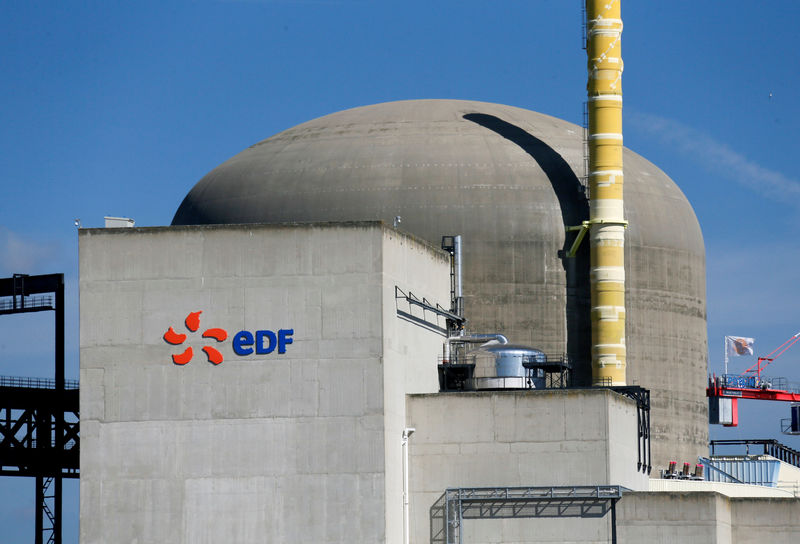By Geert De Clercq and Benjamin Mallet
PARIS (Reuters) - French presidential candidate Emmanuel Macron may delay plans to reduce the share of nuclear power in the French power mix and is considering a UK-style subsidy mechanism to build new nuclear reactors, a source close to the Macron campaign team said.
EDF shares jumped as much as 5 percent in heavy trading on the news, boosting the company's market value by about one billion euros, before closing 3.7 percent higher.
An official spokesman for Macron said the candidate would stick to the policy outlined in his campaign platform, which specifies he would respect the outgoing socialist government's target to reduce the share of nuclear in French power production to 50 percent by 2025 from about 75 percent now.
Relaxing the deadline for reducing the country's reliance on nuclear power would be highly beneficial for state-owned EDF (PA:EDF), already struggling with high debt, which otherwise could be forced to close more than a dozen of its 58 reactors.
A new subsidy mechanism for new nuclear plants would also allow the utility to build reactors at home in the coming decades, and could become an issue in an election campaign where energy has been overshadowed by globalization and immigration.
The source, who declined to be identified as he is not an official spokesman for the campaign, said a Macron government would make sure that a reduction of the share of nuclear in the mix would not jeopardize security of power supply nor lead to increased carbon emissions.
"The reduction to 50 percent is a firm objective. What could change, depending on the resources invested, is the date," the source said in an interview on Wednesday.
He said the 2025 date was "not cast in stone" and Macron would be "pragmatic" about how and when France would cut the share of atomic energy. But the source said it was essential for the country to reduce its reliance on one single energy source for reasons of security of supply.
An official spokesman for Macron said the candidate would not deviate from his campaign platform, as he had reiterated at a rally at La Villette, Paris, last weekend.
"We will respect the trajectory laid out by the energy transition law," Macron spokesman Sylvain Fort told Reuters.
LIFESPAN
Industry specialists say cutting the share of nuclear power to 50 percent would be a difficult and costly process and virtually impossible to achieve in just eight years.
But the promise to respect outgoing President Francois Hollande's energy transition law is crucial for winning green and leftist support for Macron, who is backed by several leading figures in France's anti-nuclear movement.
In a TV debate tonight, Macron will face his far-right opponent Marine Le Pen, who is strongly in favor of nuclear power and against wind energy.
The source declined to say whether Macron would back EDF's request to extend the lifespan of its ageing nuclear reactors beyond 40 years, saying the centrist candidate would wait for nuclear regulator ASN's recommendation on the issue, which is expected by the end of 2018 or 2019.
He said that if France needed to build reactors to replace existing ones, it would have to consider new support systems because at current market prices no investor would put money into nuclear. The new scheme could be similar to the UK's 'Contract for Difference' (CfD) scheme.
"We are thinking strongly about something that resembles what the British have done," the source said.
He said there were no plans to ask European Union approval for a support mechanism to upgrade existing nuclear plants, but that a CfD-like scheme could work for new ones.
"The Contract for Difference has already been accepted by the European Commission, so therefore this mechanism does not pose a problem from a legal point of view," he said. It was too soon to go into detail about how a CfD-like mechanism would be applied in France, the source said, but it could closely model the UK contract, under which an energy supplier is assured a fixed price for its power.
For its 18 billion pound (21 billion euros) Hinkley Point project, EDF has signed a CfD with Britain under which it can sell power at 92.5 pounds (109.5 euros) per megawatt hour for 35 years. If the market price is above that level, EDF refunds the difference, if it is below that level it receives a top-up.
The source said Macron supported the UK project and that it was crucial for maintaining the French nuclear industry's skill base.
EDF shares, which have fallen 32 percent over the past 12 months before Wednesday's move, were the biggest gainers in the French bourse's SBF120 index (SBF120) and in the Stoxx Europe Utilities index (SX6P) on Wednesday.
